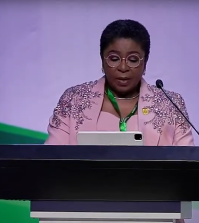Mauritius good governance law can inspire other countries, says Commonwealth official

Legislation passed in Mauritius to combat corruption and promote good governance could provide valuable lessons for other countries, the deputy secretary-general of the Commonwealth Secretariat Dr Josephine Ojiambo has said.
At a meeting last week with Roshi Bhadain, Mauritius’ minister of financial services, good governance, institutional reforms, technology, communication and innovation, Ojiambo proposed sharing the country’s best practice with other countries.
“I am pleased to hear of the enactment of the Good Governance and Integrity Reporting Act, and I believe that this will excite other Commonwealth countries to learn, adopt and adapt from your country,” she said.
Read more: Nordic countries perform best in global corruption ranking
The legislation, which came into force last year, fast tracks criminal justice processes in investigating and prosecuting people involved in corrupt practices and those possessing unexplained wealth.
The constitution of Mauritius had been amended to make provision for unexplained wealth.
Bhadain said he welcomed the Commonwealth’s support in facilitating an exchange of ideas and initiatives on a wide range of issues including good governance and technology, which he said are vital for sustainable development.
Read more: Nigeria’s top officials are warned over corruption, again
“We look up to the Commonwealth as a platform for sharing best practice,” he said.
Mauritius ranks top in the Mo Ibrahim Index of African Governance, an annual rating of quality governance in African countries.
The Commonwealth Secretariat has provided technical assistance to the Mauritius Independent Commission on Anti-Corruption in the form of training for the commission’s managers, investigators and prosecutors.
Ojiambo added: “At the last Commonwealth heads of government Meeting in Malta, heads observed that good governance and respect for the rule of law are vital for stable and prosperous societies, and for the 2030 agenda for sustainable development, and require efficient, effective and accountable public institutions.”





















